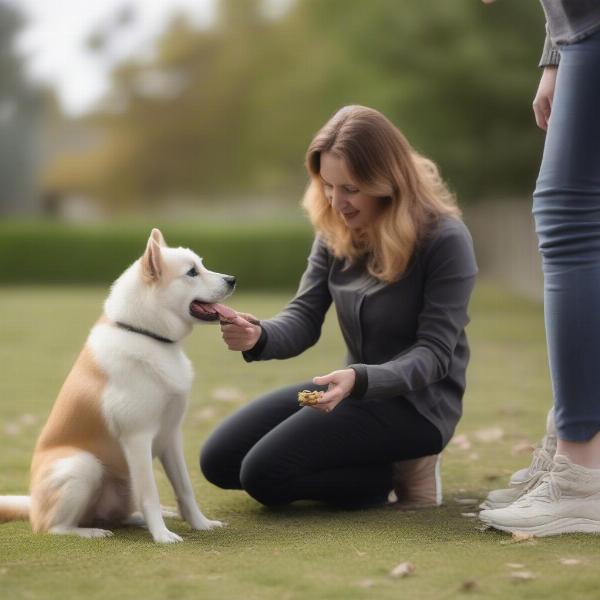Electric collars, also known as e-collars or shock collars, are a controversial training tool, especially when used on small dogs. This guide delves into the complexities of using electric collars for small dogs, offering insights into their effectiveness, potential risks, and ethical considerations. Understanding these aspects is crucial for any owner considering this training method.
Understanding Electric Collars
Electric collars deliver a mild electric shock to a dog’s neck via a remote control. The intensity of the shock is adjustable. Proponents argue that these collars can be effective in curbing unwanted behaviors like excessive barking or aggression. However, critics raise concerns about the potential for physical and psychological harm, particularly in smaller, more sensitive breeds.
Are Electric Collars Safe for Small Dogs?
The safety of electric collars for small dogs is a hotly debated topic. While manufacturers often claim their products are safe when used correctly, the potential for misuse and misinterpretation of a dog’s reactions is significant. Small dogs are more vulnerable to injury due to their delicate necks and smaller body size. An improperly fitted collar or an excessively high shock setting can cause burns, tissue damage, and even respiratory problems.
Choosing the Right Electric Collar for a Small Dog
If, after careful consideration and consultation with a qualified professional, you decide to use an electric collar, selecting the appropriate one is paramount. Look for collars specifically designed for small breeds, with adjustable shock levels and a comfortable fit. Avoid collars that are too heavy or bulky.
Effective and Humane Training Techniques with Electric Collars
The key to using electric collars responsibly lies in proper training techniques. Never use the collar as a punishment. Instead, pair the stimulation with positive reinforcement methods like verbal praise and treats. Start with the lowest shock setting and only increase it gradually if necessary. Focus on clear communication and consistency.
Alternatives to Electric Collars for Small Dogs
Numerous effective and humane training alternatives exist for small dogs. Positive reinforcement methods, which reward desired behaviors, are generally preferred. These include clicker training, lure-reward training, and shaping. These methods build a strong bond between owner and dog while addressing the underlying causes of behavioral issues.
bark shock collar for small dogs
When to Consult a Professional Dog Trainer
If you’re struggling with your small dog’s behavior, seeking professional guidance from a certified dog trainer or veterinary behaviorist is essential. They can assess your dog’s individual needs, recommend appropriate training methods, and help you address any underlying behavioral problems.
 Professional Dog Trainer Working with a Small Dog
Professional Dog Trainer Working with a Small Dog
Conclusion
Using electric collars for small dogs requires careful consideration, responsible use, and a deep understanding of canine behavior. While they can be effective in certain situations, the potential risks and ethical concerns should not be overlooked. Exploring alternative training methods and seeking professional guidance are crucial steps in ensuring your small dog’s well-being and fostering a positive training experience. Remember, a well-trained dog is a happy dog.
FAQs
- Are electric collars cruel for small dogs? Their use is controversial, with potential for harm if misused. Positive reinforcement methods are often preferred.
- What is the best electric collar for a small, sensitive dog? Consult a professional for recommendations based on your dog’s specific needs.
- Can electric collars cause aggression in small dogs? Improper use can worsen existing behavioral issues or create new ones.
- What are some alternatives to shock collars for small dog training? Clicker training, positive reinforcement, and professional guidance are effective alternatives.
- How do I fit an electric collar correctly on my small dog? Refer to the manufacturer’s instructions for proper fitting and avoid over-tightening.
- Can I use an electric collar on a puppy? Consult a veterinarian or professional trainer before using any training collar on a puppy.
- What should I do if my small dog reacts negatively to an electric collar? Immediately discontinue use and consult a professional trainer or veterinarian.
ILM Dog is a leading online resource for dog owners worldwide, providing expert advice on all aspects of dog care, from breed selection and health to training and nutrition. We’re dedicated to helping you build a strong, loving bond with your canine companion. For personalized advice or to learn more about our services, contact us at [email protected] or call +44 20-3965-8624. Visit ILM Dog for more information.